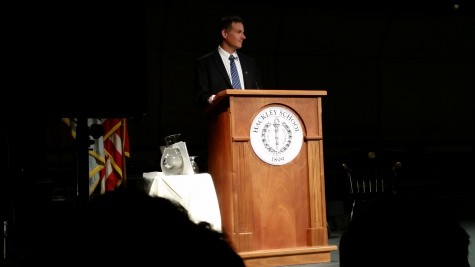David Einhorn Addresses Philanthropy in Forbes Lecture
March 19, 2015

A hush settled over the PAC and senior Rachel Einhorn beamed as she took the podium to introduce this year’s Forbes Lecturer, her “hero” and father David Einhorn. Rachel was clearly proud of her father’s philanthropic work, and Mr. Einhorn’s passion for this work became became immediately evident to the Hackley community as well.
Mr. Einhorn, President of Greenlight Capital, an extremely successful hedge fund, and his wife Cheryl Einhorn, founded the Einhorn Family Charitable Trust (EFCT) in 2002 with the goal of “helping people get along better.” EFTC partners with “research-backed nonprofits” that “nurture the positive side of human nature” in an effort to build a more “civil and harmonious” society, and has granted over $100 million to these partners. Mr. Einhorn’s speech stressed the importance of philanthropy, focusing on EFCT’s charitable work. Hackley’s Forbes Lecture series, established in 1989 by Malcom S. Forbes ‘37 in honor of his brother Bruce Forbes ‘35, has brought a variety of prominent speakers to Hackley’s campus, including Steve Forbes, Joe Klein, Ralph Nader, and Barack Obama. Each speaker shares ideas and experiences about which they are passionate.
According to Mr. Einhorn, his goal of helping people work together is “a means to an end” — people must to work together to “solve the world’s most difficult problems.” Although this may seem like a vague, unachievable objective, Mr. Einhorn believes that it is possible by promoting, through small, incremental changes, improvements in communication between people, empathy, patience, and kindness. Mr. Einhorn emphasized that Greenlight Capital grew incrementally, beginning with only $900,000 in investments, and growing to $5 billion today, demonstrating the potential of incremental change to effect widespread results over time.
Mr. Einhorn explained that people are not naturally born with these traits, and instead must learn them early in life by observing strong role models and must practice them constantly to improve, “like learning a language.” He said that they are “best learned when children work together to develop them in a good environment” through “hands-on, practical learning and service experiences.”
Mr. Einhorn aspires for people to become “so steeped” in these values and make them “so pervasive” that they “almost become invisible,” unconscious parts of people’s lives. To this end, Mr. Einhorn and the EFCT identify and contribute to organizations that provide opportunities to promote these values, particularly among children.
One of Mr. Einhorn’s greatest concerns in achieving his goal is the “rhetoric-reality gap,” between what people and organizations state as their goals for developing good values in children and their efforts to and success in implementing change. Therefore, the EFCT invests primarily in organizations that have proven track records of achieving change, and continually improve and help more people; these organizations include City Year, which works to improve the lives of and provide good role models for children in inner city schools, and the Interfaith Youth Corps, which works to stimulate positive, productive dialogue between people of different religions and backgrounds in colleges.
Despite Mr. Einhorn’s passion for his charitable work, which is shared by the Hackley community, reactions to the speech among Hackley students were mixed.
Junior Julia Morgenstern thought that the speech was very “inspiring” and “more relevant than some of the other speeches [Hackley] has had” in the past. She also found it “more relatable,” since the speaker was a Hackley parent and had a more direct connection to the community than other speakers. At the end of his speech, Mr. Einhorn also fielded questions from several Hackley students who were curious to learn more about his philanthropic and business ventures.
Freshman Alex Finerman said that “the speech was kind of interesting,” but believes that Mr. Einhorn’s goals, as laid out in the speech, seemed somewhat unrealistic and overly ambitious.
Junior Brian Schmitt said that the ideas in Mr. Einhorn’s speech about “cultivating empathy and cultivating better world views” in childhood were “brilliant.” However, Brian was surprised that Mr. Einhorn “didn’t see all of his uses of money [in his business] as capable of creating empathy in the world” and that Mr. Einhorn said that he would invest in companies that did not practice his ideals of helping people work together better. He also said that the speech fit well with what he sees as the overarching message of all of Hackley’s lectures, “the idea that we can all make a difference.”
